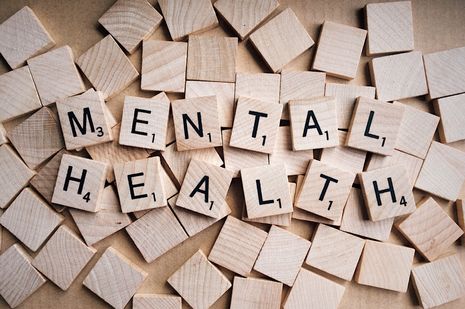“I was petrified I was losing my mind”: Why we must go further in our discussion of mental health
The COVID-19 pandemic has seen a renewed focus on our mental health, but Deputy Editor Elizabeth Haigh argues from her own experiences with dissociation that we will not achieve true progress without paying due attention to these lesser-known conditions.

Content Note: This article contains detailed discussion of mental health issues, dissociation and brief mention of self-harm.
I dissociated for the first time at the end of last term. I felt as if I was somehow separate from my body: I couldn’t feel anything, physically or emotionally. I couldn’t think straight, couldn’t speak in coherent sentences. I stared into space.
I hadn’t even heard of ‘dissociation’. I certainly didn’t know what it meant. All I knew was that something was desperately, terribly wrong. And I was petrified that I was losing my mind.
According to Mind, there are six main types of dissociation, though everyone’s experience is different. Mine was depersonalisation: a disconnect from my own body and emotions, a feeling of being outside of myself, a struggle to recognise my body as my own. It can be a conscious decision to deal with traumatic situations, but is more often an involuntary symptom of mental health conditions such as Post-Traumatic Stress Disorder (PTSD). Researching it allowed me to rationalise and normalise my experience, and recognise what triggered it. But I can’t help wishing that I had known that this kind of mental health event was possible before it occurred.
“One of the positive things to have emerged from this pandemic is a renewed conversation around mental health.”
One of the positive things to have emerged from this pandemic is a renewed conversation around mental health. Amidst lockdowns, economic hardship and reduced social contact, this discussion has arguably never been more important. For many trauma survivors in particular, the constant uncertainty and isolation has had a detrimental impact, intensifying symptoms such as anxiety and flashbacks.
But this conversation has not gone far enough.
In recent years, we have made major progress in encouraging discussion of mental health on social media and in our everyday lives. But this can often feel hollow. Those innocuous chain messages on Facebook – while they may show that people care about mental health – represent a type of ‘recognition’ that can seem like an empty gesture to those struggling, especially now, when in-person communication is restricted.
Many of us know the symptoms of depression and anxiety. At school, we are taught mindfulness and how to cope with exam stress by teachers who, at least in my experience, would clearly rather be teaching something else. But what is lacking in our supposedly modern society is discussion of more confusing, lesser-known mental health issues, and education on how to recognise and deal with them. We are poorly prepared for some of the realities of mental health, whether our own or those of our friends and families. It is often easy to identify when someone is upset or anxious. When you are stuck in the throes of dissociation or psychosis, however, few are prepared or willing to help you to deal with it. If we are to support each other, surely we must talk about every side of mental health – after all, how are we supposed to approach something that is completely unknown?
“Locked away in our homes, it is easy to feel as if we are falling through the cracks, and even easier to become a bystander to someone else’s crisis.”
The simple facts are that a friend who is feeling low is often easier to face than one who is hurting themselves, who is convinced they are someone else or who is hearing voices. This is not to say that no one wants to help - many people do. But as a society, we are taught to look away from the strange man muttering to himself in the street, from the woman staring at something no one else can see. It’s too much, too strange. We never pause to question if there’s something we can do. Coronavirus may have brought society closer in some ways, but locked away in our homes, it is easy to feel as if we are falling through the cracks, and even easier to become a bystander to someone else’s crisis.
One in four adults in the UK experience a mental health problem in their lifetime. One in fourteen will self-harm. Although depression and anxiety are the most common mental health issues diagnosed in the UK, one in 50 people will be diagnosed with Borderline Personality Disorder (BPD) or Bipolar Disorder. Thankfully, many of us have an understanding of Bipolar, but how many of us would know what was happening when someone showed signs of BPD?
The pandemic is hard for us all, and will no doubt lead to a rise in demand for mental health services. Now, in the middle of our renewed focus on mental health, we have a unique opportunity to normalise the less ‘normal’ conditions, and to educate ourselves on how to help not only those we love, but also complete strangers if necessary. If we truly want to support one another and the NHS, instead of merely spouting empty platitudes, we must make an active effort to educate ourselves, and others, about all the sides of mental health.
When I dissociated last term, I was lucky to have someone with me who could see that something was wrong, and who refused to leave me alone, despite having no more knowledge of the issue than I did. Yet I wish that at least one of us had been properly prepared. If we had had even a basic understanding of dissociation, one of us might have identified what was happening - and I wouldn’t have felt like I was losing my mind.
 News / Judge Business School advisor resigns over Epstein and Andrew links18 February 2026
News / Judge Business School advisor resigns over Epstein and Andrew links18 February 2026 News / Gov grants £36m to Cambridge supercomputer17 February 2026
News / Gov grants £36m to Cambridge supercomputer17 February 2026 News / Union speakers condemn ‘hateful’ Katie Hopkins speech14 February 2026
News / Union speakers condemn ‘hateful’ Katie Hopkins speech14 February 2026 News / CUCA members attend Reform rally in London20 February 2026
News / CUCA members attend Reform rally in London20 February 2026 News / Hundreds of Cambridge academics demand vote on fate of vet course20 February 2026
News / Hundreds of Cambridge academics demand vote on fate of vet course20 February 2026










